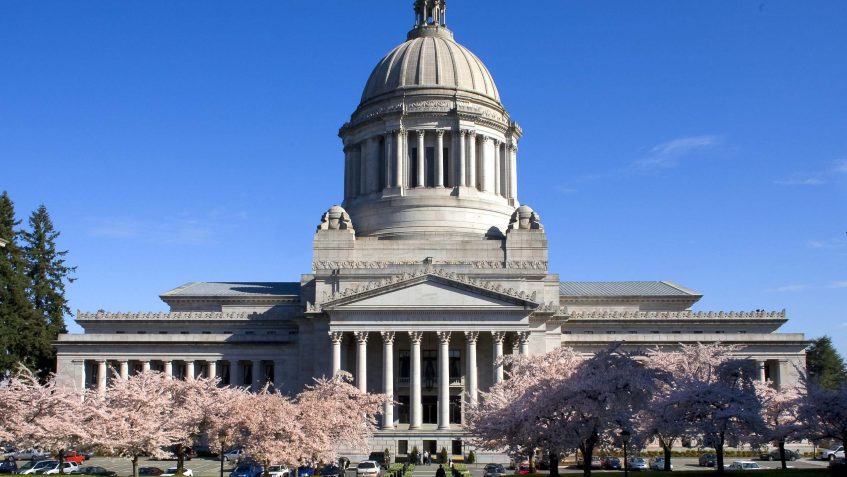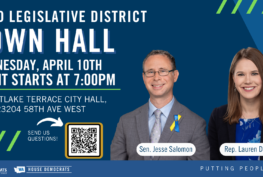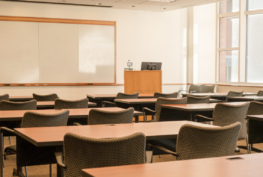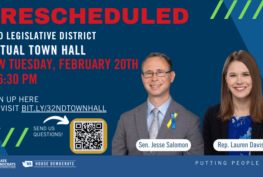Dear Friends and Neighbors,
One of the Legislature’s most important jobs is passing a budget for Washington state. Every year, the Senate and House agree on a single version of three different budgets: operating, capital and transportation. Each directs funding to the programs, projects, and construction required to move Washington forward year after year.
This all might sound complicated, but really it boils down to talking to members of our communities to hear what they need funded and working with partners to create the formal requests we use to direct state dollars.
I’m proud of this year’s supplemental budget, which will bring much-needed funding to Washington’s K–12 schools, behavioral health system, affordable housing, and ongoing climate transition. Alongside those critical investments, I’m excited that a number of funding requests my office advocated for included in the final budget, like:
- The Shoreline Park Development
- Shoreline West Echo Lake Restoration
- The Jewish Historical Society
- Wildlife Crossings
- Improved Security for Non-Profits
- Mountlake Terrace Station Area Housing Plans
- First-in-the-Nation Ibogaine Study
- Ukrainian Refugee Resettlement
Those last two requests are incredibly close to my heart, and I hope you’ll read on for a deeper dive into these transformational budget items, as well as details about our upcoming town hall!
A First-in-the-Nation Study of Ibogaine Treatment
Ibogaine is a naturally occurring plant medicine derived from the iboga shrub. It is the only substance in the world known to allow a person to substantially reduce most of the withdrawal symptoms from opioids. Not many people have heard of ibogaine treatment, which is available in Mexico and Brazil, but initial studies have shown it to be a cheap and startlingly effective treatment option for Opioid Use Disorder (OUD).
If this is the first time you’re hearing about ibogaine, I recommend this Ted Talk as an excellent way to learn more about its potential. Current treatment options are mostly relegated to long-term rehabilitation centers and medication-assisted therapy, where a person struggling with heroin or fentanyl dependence is prescribed a safer alternative opioid, such as methadone or buprenorphine. Studies have shown ibogaine to be 30% more effective than buprenorphine while exhibiting fewer side effects. In research undertaken at UC San Diego, 30% of participants maintained their sobriety a year after their ibogaine treatment. (While this may sound like a low number, the sad truth is this is a very high success rate for a treatment approach for this type of addiction).
As exciting as these numbers are, the direct lived experience of those who overcame OUD using ibogaine treatment is what motivated me to work on directing state funds toward ibogaine research. When the Kentucky Opioid Abatement Commission considered using addiction relief dollars for ibogaine research, many came forward to speak in support.
“I consider my life pre-ibogaine and post-ibogaine,” said Paria Zandi, a family therapist from Los Angeles. “The best way I can explain it is that Ibogaine gave me a fresh pair of eyes with which to see the world and myself; this year I’ll be ten years sober.”
“I tried every traditional treatment that was out there,” said Jessica Blackburn, who described multiple unsuccessful attempts at sobriety through rehabilitation centers using buprenorphine and methadone treatment before successfully achieving sobriety with ibogaine. “My first treatment gave me years of freedom. I no longer felt powerless, and I’ve never felt powerless since.”
This medicine shows real promise as another tool for treating opioid addiction, but since this does not require taking pharmaceuticals on a long-term basis, there has not been much interest from pharmaceutical companies to invest in the research that would bring a drug to market through traditional means. The responsibility falls to us, and this year’s budget directs $250,000 to establish the nation’s first state-funded study into the use of ibogaine therapy for those suffering from opioid addiction.
Supporting Our Ukrainian Refugees
In February, the war in Ukraine dragged into its third year. Most of us could scarcely imagine what it would be like to see our streets, schools, and homes become a theater of war. For the over 16,000 Ukrainian refugees settling in Washington state, they need not imagine. They came to this country to seek a better, safer life, and I am proud this year’s budget directs additional funding toward the organizations supporting refugees in our district and help them build a happy, productive life here.
Galina Volchkova, the executive director of Housing Services at the Volunteers of America Western Washington, told me, “Since May 2021, over 800 households in our Refugee Resettlement and Stabilization program have been employed and self-sufficient. They are succeeding because of their resilience and because we offered timely access to resources, rental assistance, and job opportunities.”
The funds we direct toward housing assistance, job training, support organizations, and resettlement programs make a tangible difference in the lives of Ukrainian refugees who have so much to offer our state when provided the resources needed to thrive.
Throughout our history, Ukrainians and Ukrainian Americans have enriched our communities through their resilience, leadership, and culture. With this year’s supplemental funding, we will continue to help refugees bear the immense physical and psychological toll of this war.
Join us at our April 10 town hall!
While it might seem like the bulk of this year’s work is done, it’s really just begun. The time in between legislative sessions, called “interim,” is critical; it’s our best opportunity to meet with community members, discuss the most important issues facing our district, and begin drafting bills for next year.
With that in mind, I’m excited to announce that Rep. Lauren Davis and I will host an in-person town hall 7 p.m. April 10 at the Mountlake Terrace City Hall.
This is your chance to hear a post-session update, have your questions answered, and discuss what issues you’d like to see the Legislature address, so I hope we’ll see you there!
Sincerely,





